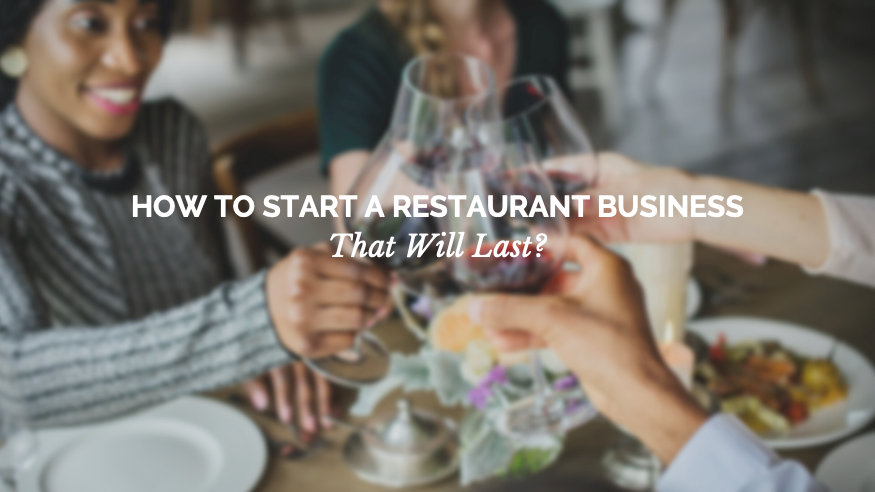Starting your very own foodservice business is exciting! Set yourself up for success by knowing every bit of how to start a restaurant business that will be in the long run.
The Plan
This is where it all begins. Perhaps the most crucial thing about how to start a restaurant business, a business plan defines every single aspect of your restaurant: your products and services, your target market, your goals, the costs and expenses, and the entire scope of your management and operations from hiring and training staff to advertising and marketing. A well-crafted business plan matters to investors and lenders.
In here, you will have to paint a picture of your ideal customer by studying demographics and psychographics. Keep up with the trends in customer behavior and the industry to determine what type of restaurant is best for you.
Fast food is still popular, but healthier alternatives like fast-casual are on the rise! The line between casual and fine dining is starting to get thinner too so leverage the other’s strengths and unique experiences to make a mark. Other considerations include:
- An untapped or uncommon niche
- A concept you’ll enjoy running for a long time
- A new angle to common foods or current trends
- Liquor offerings as a major profit boost
The Funding
Part of how to start a restaurant business and keep it in operation is being financially capable to finance it during the first six months or until you generate profits. Here are your best options for financing your restaurant.
- Rollover business startups – great for first-time restaurant owners, should be registered as C-corporation, $50,000 tax-deferred retirement account
- Online lenders – faster processing but comes with higher interest rate
- Investors – shared control of the restaurant and liability; bring expertise and knowledge to the table to provide informed insight and ideas
- Equipment financing – covers the cost of equipment, which serves as collateral for lower interest rates. May or may not require a downpayment
- Family and friends
- Crowdfunding
The Location
If you want to know how to start a restaurant business that will actually thrive, find the perfect location. Here are a few tips:
- Check on the state’s website to find areas with excellent vehicle traffic
- Look for high foot traffic for a better chance of impulse sales
- Make your location an attraction that people will set out to visit
- Learn building history by talking to neighbors and previous tenants
- Check with the local planning board about future developments planned near your restaurant that can impact your business
- Don’t sign a long lease or a large space if the restaurant is brand new
- Use the Industry Snapshot tool to get an overview of the competition
- Consult the Uniform Crime Reports to check criminal activity and criminal rates at the zip code level
The Menu
- Develop a list all your planned menu items
- Create recipes and a step-by-step preparation process to determine labor, time, and equipment required
- List every single ingredient and calculate the price
- Find a reliable food supplier such as local farmers, markets, and butchers or a large wholesaler
- Price each dish accordingly
The Design
Your front of the house to the back should promote a systematic and productive workflow while helping extend shelf life of ingredients and lowering utility costs.
For the kitchen, think about ventilation, equipment clearance requirements, plumbing, and electricals while also providing comfortable moving space. For the dining area, adequate sitting and elbow room should be first on your list. Hiring a foodservice consultant to design your restaurant that’s best for your space, budget, and menu is recommended.
The Legalities
Part of how to start a restaurant business right is to obtain permits and licenses, which will take a few months.
- Business license ($75-$7,000) to register your business to the state government-
- Employer Identification Number (free) from the Internal Revenue Service for tax administration. Only one EIN is given out per day. Online application offered
- Certificate of occupancy ($100) issued by the local government to certify that your building is safe to do business in
- Foodservice license ($100-$1,000) is given after passing a health inspection.
- Food handler’s certification – Consider implementing online food handler’s certification training for kitchen staff to ensure food health and safety guidelines are observed at all times in your kitchen.
- Sign permit ($20 to $50) – submit your design to city government for approval
- Employee health permit issued after staff passes a state-approved training course for sanitation, proper food handling and storage, and disease prevention
Optional licenses needed on how to start a restaurant business
- Beer and wine license – perfect for restaurants, generally cheaper, easy to apply for, but limited selection
- Liquor license – to serve beer, wine, liquor, and other alcoholic drinks, expensive, and might be difficult to acquire depending on state availability
- Music license ($250-500) for playing copyrighted music; a live version or audiovisual cover might be priced differently.
- Live entertainment
- Valet parking
- Dumpster placement
The Equipment
Your restaurant needs the right kitchen equipment for safe and productive operation. For one, ice will always be essential, so consider adding Manitowoc ice machines to your kitchen. Examine your menu to see if you might need a commercial grill or griddle in addition to a stovetop cooking range.
Learn a few tricks
Familiarize yourself with how to compute food costs and inventory to learn which menus are the most profitable for you, reduce waste, anticipate and meet daily production demands, and manage expenses.
more on incrediblethings.com




